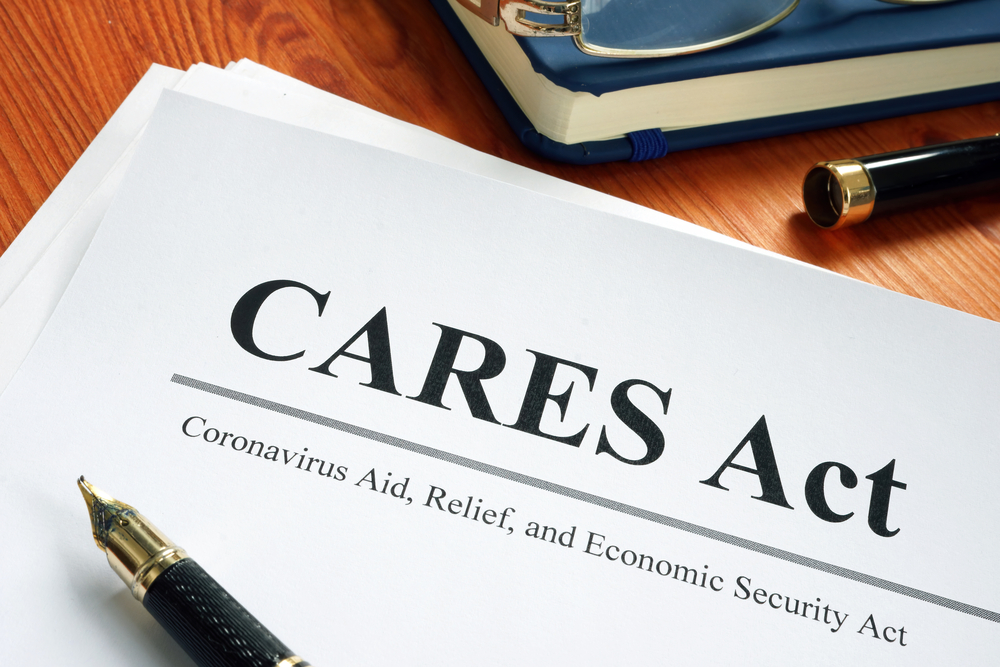

 The side effects of COVID-19 go far beyond the physical health of those exposed. The economic impact is widespread and far-reaching, and the government has been constantly struggling to find ways to relieve some of the economic downturn brought on by this pandemic. The most recent of these efforts is the Coronavirus Aid, Relief, and Economic Security, or CARES Act. It’s the largest economic stimulus legislation since the New Deal that was passed in the 1930s, and includes $2 trillion of federal funding. Here are some of the major highlights of this act that may be impacting you.
The side effects of COVID-19 go far beyond the physical health of those exposed. The economic impact is widespread and far-reaching, and the government has been constantly struggling to find ways to relieve some of the economic downturn brought on by this pandemic. The most recent of these efforts is the Coronavirus Aid, Relief, and Economic Security, or CARES Act. It’s the largest economic stimulus legislation since the New Deal that was passed in the 1930s, and includes $2 trillion of federal funding. Here are some of the major highlights of this act that may be impacting you.
Extending Deadlines
As most taxpayers have heard by now, the 2019 tax deadline has been extended to July 15th. This not only enables citizens to focus on more important matters in their day-to-day lives, rather than getting tax returns together, but it also allows those who owe their taxes to hold onto those funds for a while. (While the initial extension was only for filing, it was very quickly amended to include an extension for payment as well.) This new deadline also applies to any contributions to HSAs and IRAs that you want to deduct on your 2019 return.
Individual Relief Payments
This portion of the bill made the most headlines in the country, as its impact is more immediate, apparent, and widespread. The CARES Act provides most citizens with $1,200 for every adult, plus $500 for each of their dependent children. There is an income threshold to these checks. Individuals who make more than $75,000 in adjusted gross income (or $150,000 for joint filers) will begin to see a gradual decrease in the amount of their stimulus checks. The checks are phased out entirely for individuals who make more than $99,000, or couples filing jointly who make more than $198,000.
By now, most people have received their stimulus checks. If you haven’t yet, and you know you’re expecting one, you can check the status of your check here.
Extended Family Leave and Sick Leave
Federal law has also required employers to extend sick leave and paid family time. Employees must be allowed up to two weeks of sick leave, with full pay, if they are quarantined after being diagnosed with COVID-19 or are experiencing symptoms of the virus and need to seek testing. This is capped at $511 per day, or a total payment of $5,110. They must also be given up to two weeks of leave, with pay at two-thirds of their normal pay rate, to care for another person who is sick. This type of leave is capped at $200 per day, or a total of $2,000.
Employers must also allow for employees to take up to ten additional weeks of paid family leave to allow for them to care for school-aged children whose schools have closed in the wake of the pandemic. This leave includes two-thirds of the normal pay rate, plus job protection, and is capped at $200 per day, or a total of $10,000.
Tax Credit for Self-Employed Workers
Regular W-2 employees are not the only ones being afforded extra protection during the COVID-19 pandemic. Self-employed workers can claim a tax credit of 67% of your average daily pay, or up to $200 per day, for sick and family leave if you are caring for a sick family member or have school-aged children you must now teach and care for after school closures. Additionally, if you are quarantined or receiving testing for COVID-19, you can receive 100% of your average daily income, or up to $500 per day, in emergency paid sick leave.
Withdrawals from Retirement Plans without Penalties
Finally, if you find yourself in need of additional funds to help you through this difficult time, the CARES Act also allows you to withdraw up to $100,000 in funds from your retirement accounts to cover pandemic-related hardships and expenses. Normally, early withdrawals would result in a 10% penalty, but this is being waived to allow citizens access to these funds if needed.
You must have a clear and measurable hardship directly related to the pandemic to qualify for this penalty waiver. This would include losing your job, being furloughed, having your hours reduced, being diagnosed and/or quarantined, and being unable to work due to the need to care for children at home.
If you do qualify and take advantage of the penalty waiver, please note that you will have to pay income tax on the distributions; however, the amount can be spread out over three years. Or, if you repay the full amount withdrawn within three years, you do not have to pay income tax on it.
The CARES Act has many other provisions and laws, but these are just a few that we felt would most interest and directly impact our clients. If you have any questions about these changes, your relief check, or other tax and finance questions, please reach out to our expert accountants today.
Article provided by: